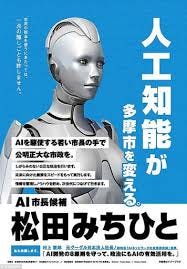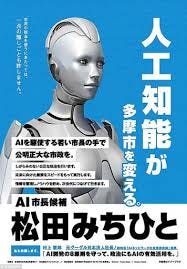The beginning

Imagine it’s election season. You’re walking across the street and the politics is in the air.
When you left home, the TV presenter was reading the results of a recent pre-election poll. The new candidate is racking up votes. You paid little attention.
As you walk along, you see people huddled around a newsstand. They are arguing whose politician’s plans or policies is better.
You can guess that all the other people looking into their phones may be seeing campaign ads, tweeting or chatting with friends.
News of a promising candidate filters through the noise. They say he’s one of a kind. A never-before-seen contender for mayor of your city.
You think, “Smh. All politicians are the same”.
Then you see it.
The poster plastered on the sidewalk.
And you can’t believe it …
It’s a robot.
The new way to rule

One of our superpowers as humans, is our ability to reshape societal structures at will.
Thanks to this capability, various forms of societal structures exist all over the world. And one country could change to different structures over time.
For most of today’s world, the idea that power belongs to the people and that they can then delegate that power to authorities who will serve them, is predominant.
The ideal democratic society is one where all the members of the society have truly equal access to the opportunities and platforms to project their voices, provide contributions and receive equitable societal benefits.
Democracy has been adopted in various forms and to varying degrees of success. And we’re so far from democratic societies that truly work.
For example, improper distribution of resources and unaccountability and corruption of government officials muddy today and make the future seem bleak.
But we won’t stop trying, right?
How can we create democratic structures and systems that effectively deliver?
One way could be through information technology.
This digitalized world won’t get enough of digital tools. For a good reason, we want to milk the conceivable digital ecosystem of all its tools and deploy them to build a better human condition.
And there’s a bright idea.
We want to use computer algorithms to reorder society and how governments operate.
There are so many names for this one.
Algorithmic or algocratic governance. Algorithmic legal order. Algorithmic regulation or regulation by algorithms.
And sweetly, algocracy.
Nice name but, what is this one?

Here’s when we apply computer algorithms to law enforcement, regulations, and other aspects of societal life.
There are many applications of this that work.
From smart cities, smart contracts, using algorithms in justice, disease surveillance and the prevention and management of environmental disasters.
However, while we apply algorithms to organize societies. We should only understand that these are at their best, only high-level tools.
And tools are at the behest of the user of the tool.
Going further, some think that algorithmic tools will do better in the hands of other algorithms.
AI can’t be corrupt or lobbied. It can’t be motivated by greed, political affiliation or be nepotic.
So, why don’t we just elect them to political offices?
OK. How’s that possible?
Let’s say we compile a huge dataset of citizen’s petitions. Then, we train an AI on this large dataset.
The AI could provide recommendations for how to deal with societal problems. And then the suggestions can be executed by human proxies.
Sounds cool, right?
Interestingly, this isn’t me imagining things.
People are trying to make this happen.
In Tokyo, the bustling capital of Japan, it seems people are getting fed up with humans leading them.
And they are looking to computers for some change.
Michihito Matsuda, a Japanese activist, ran for Mayor of the Tama city area of Tokyo.
However, he was only a human proxy for a “robot”, or more appropriately, an artificial intelligence program that was trained on Tama city datasets.
Backed by top tier executives at Google and SoftBank, the “AI mayor” campaigned that it excelled beyond human politicians in analyzing petitions that were presented to the city council in a more ‘fair and balanced’ way.
Seems many people believed this. The ‘AI Mayor’ only came third at the election.
The rise of AI politicians
Away from Japan, chatbots are leading critical political discussions.
The Danish Synthetic Party nominated “Leader Lars” to run in the 2022 Danish parliamentary election.
Thing is, Leader Lars (or Leder Lars) is a chatbot who leads a political party and doesn’t pretend to be a ‘real’ candidate.
I last read that the creator of New Zealand’s SAM says the chatbot will run in 2020. Although I haven’t seen any update on this story, I wouldn’t be the least surprised if it did.
In conclusion,
One day, we might elect an artificial intelligence program to power. How well would it perform? Would we hold it to the same standard as human politicians?
Would they reflect futile ideological biases in the way they approach problem-solving?
And would the people of the future think the idea of a algorithm ruling over them is no longer cool?
Maybe, algocracy is the next logical step in the evolution of societal organization.
And if it really is, we’ll try it.
And it’ll work.






Great piece, brother.
AI LOKAN😅